In the fast-evolving field of Chemical Engineering, a standout resume is essential for securing your dream job. Our extensive collection of resume examples for Chemical Engineer positions will provide you with the inspiration and guidance needed to highlight your unique skills and accomplishments. Whether you’re a seasoned professional or a recent graduate, these examples are designed to help you navigate the competitive job market and make a lasting impression on potential employers.
Chemical Engineer Resume Examples – Free Download
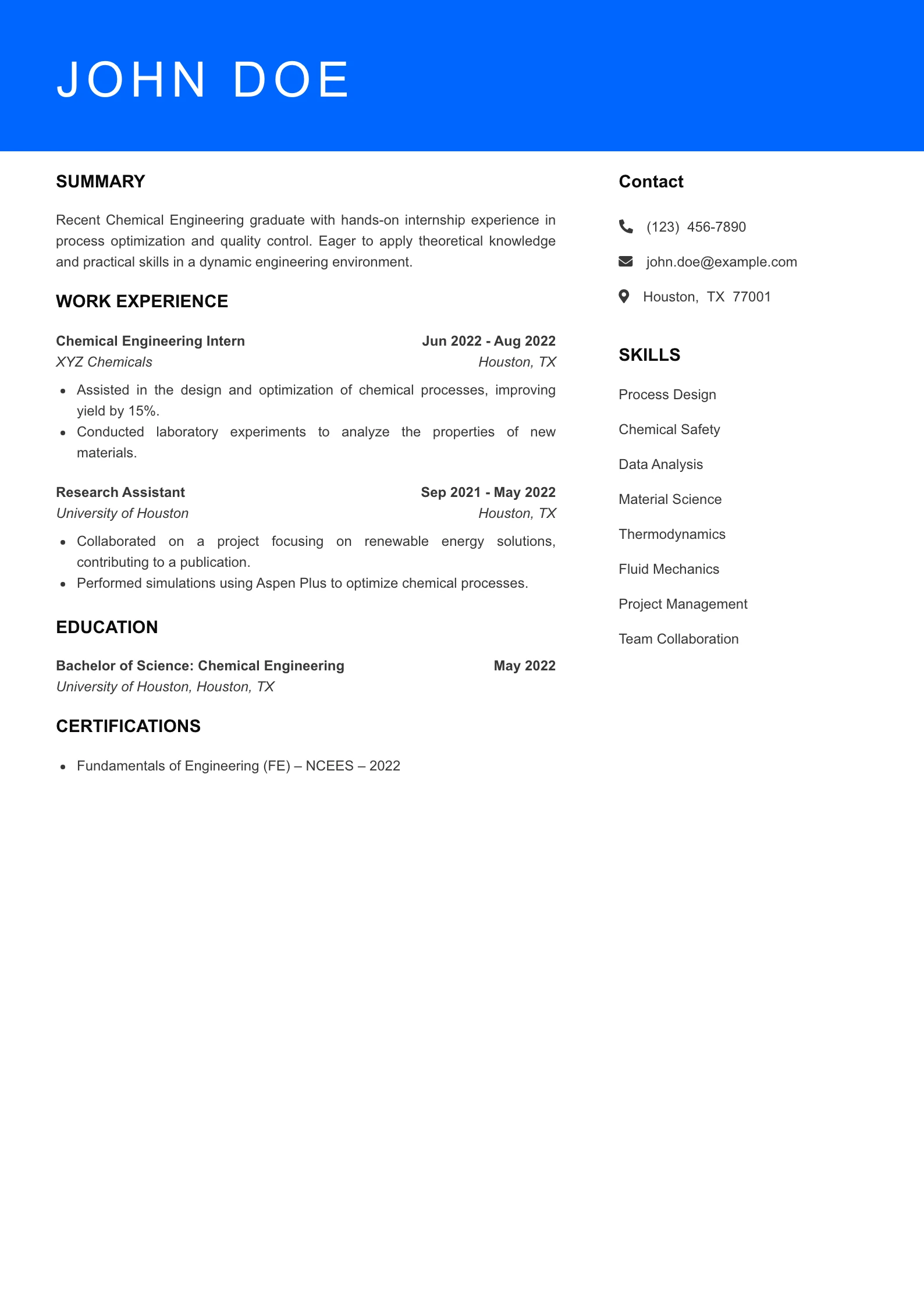

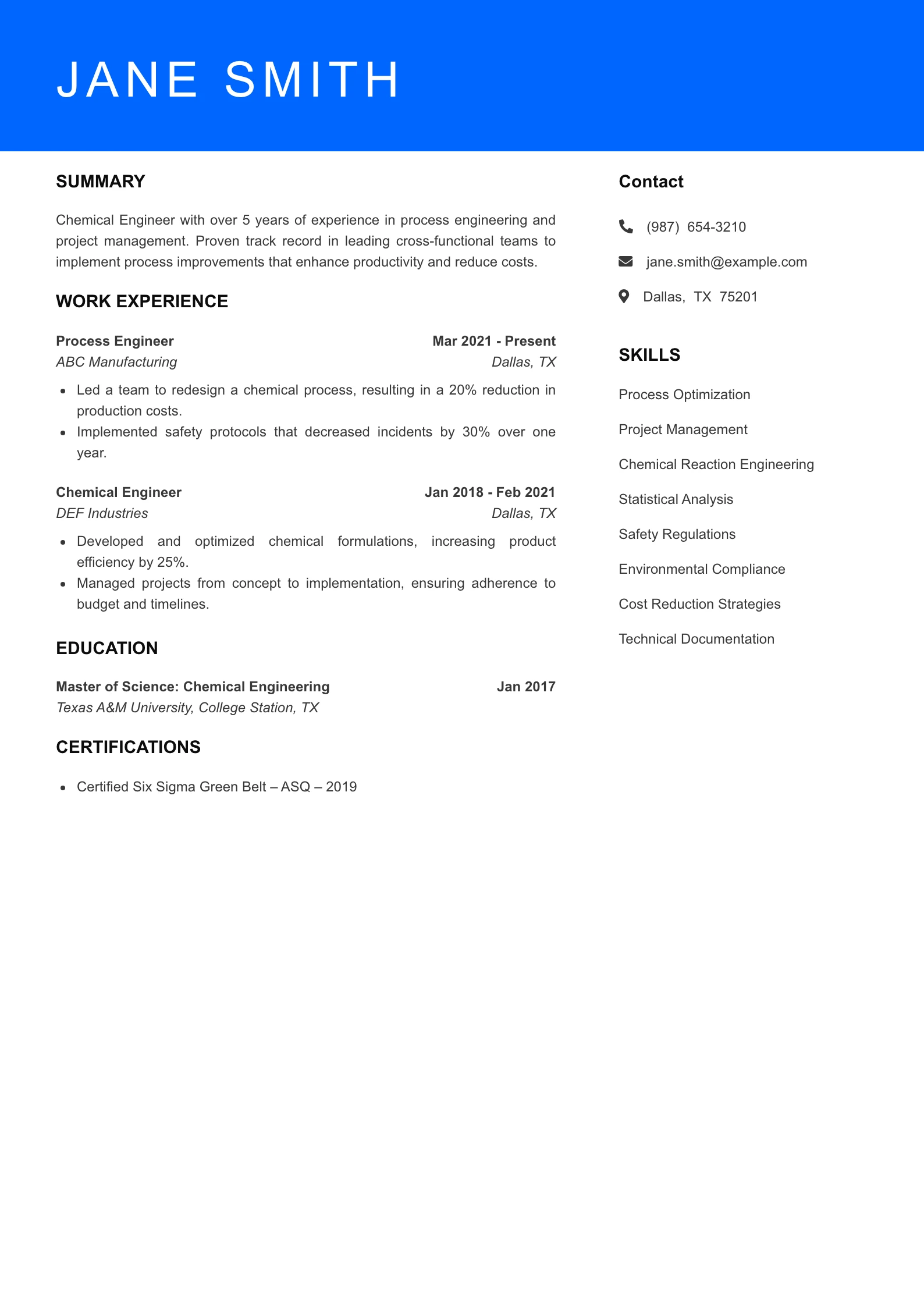
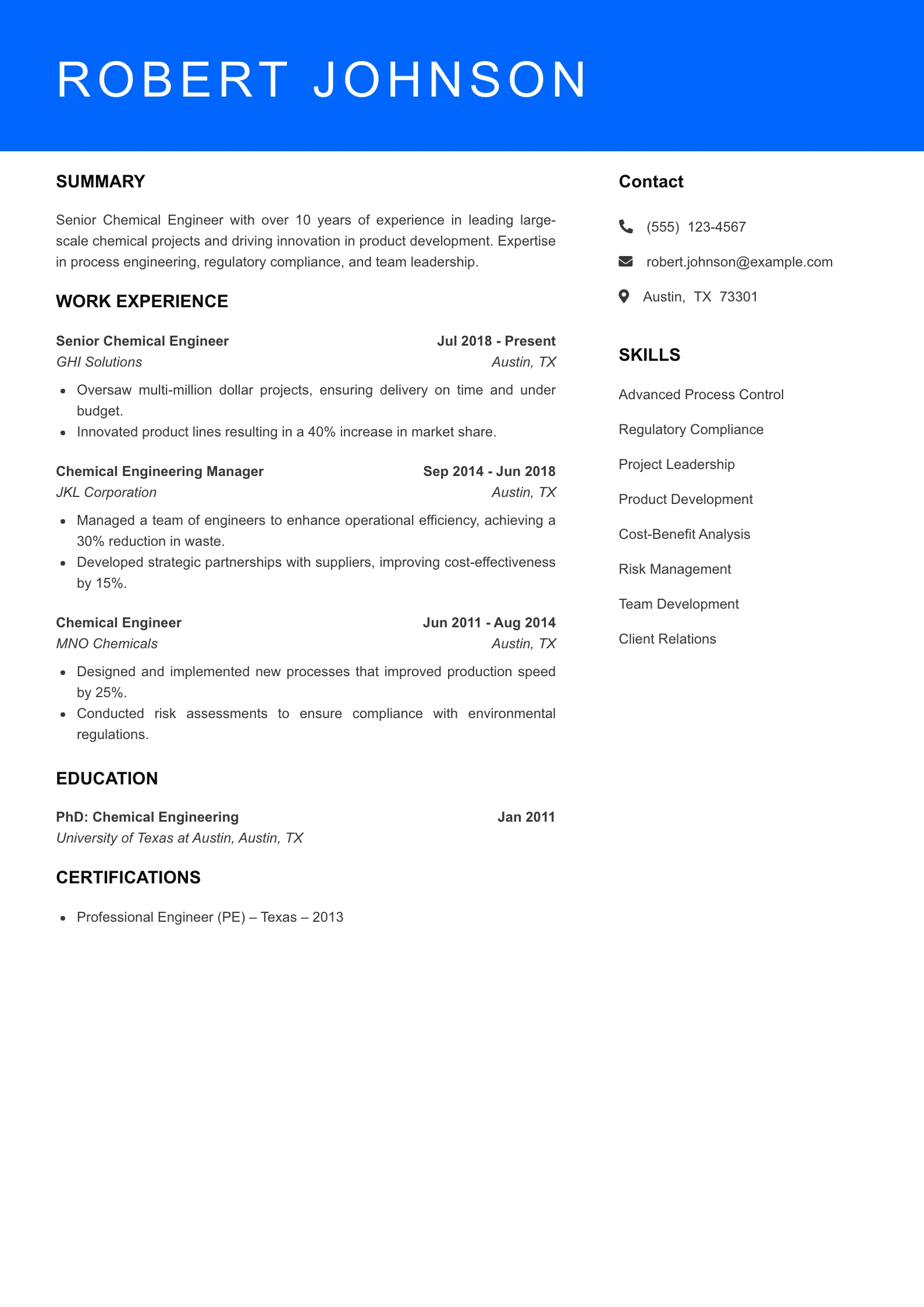
Chemical Engineer Resume Examples
Entry Level Chemical Engineer Resume Example
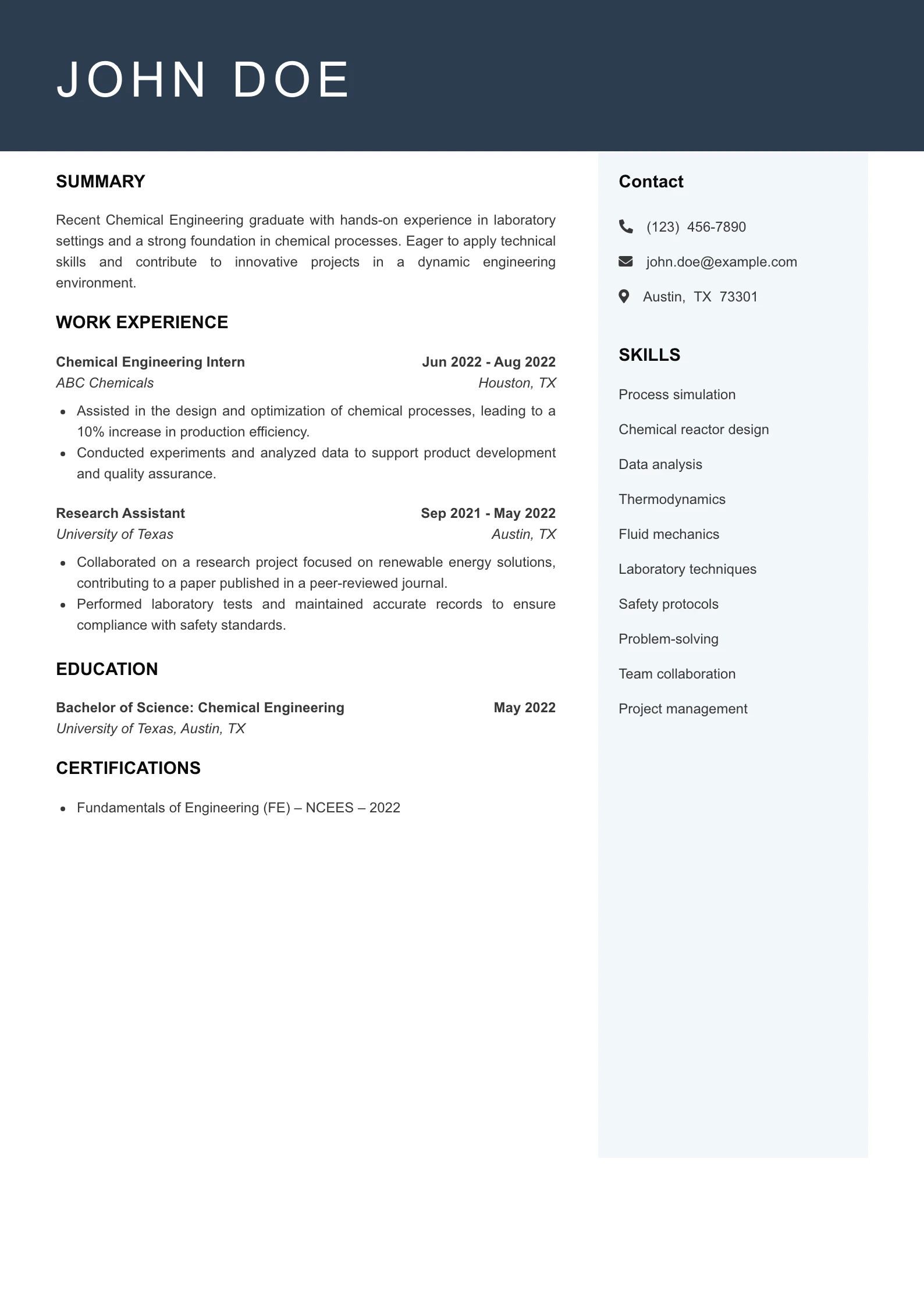
Why This Resume Works
- The summary is clear and concise, effectively highlighting John Doe’s recent educational background and eagerness to apply his technical skills in a practical setting, making it suitable for entry-level positions in engineering.
- Relevant skills are well-articulated, showcasing a blend of technical expertise (e.g., process simulation, chemical reactor design) and soft skills (e.g., problem-solving, team collaboration), which are essential for a successful engineering role.
- The work history demonstrates impactful contributions, particularly through quantifiable achievements such as a 10% increase in production efficiency during his internship, illustrating his ability to deliver results.
- The job fit is appropriate for an entry-level candidate, as the resume emphasizes recent academic achievements and internship experience without overstating qualifications, aligning with expectations for a recent graduate.
- The clarity and tone of the resume are professional and straightforward, making it easy for hiring managers to quickly assess John’s qualifications and potential contributions to their team.
Mid Level Chemical Engineer Resume Example
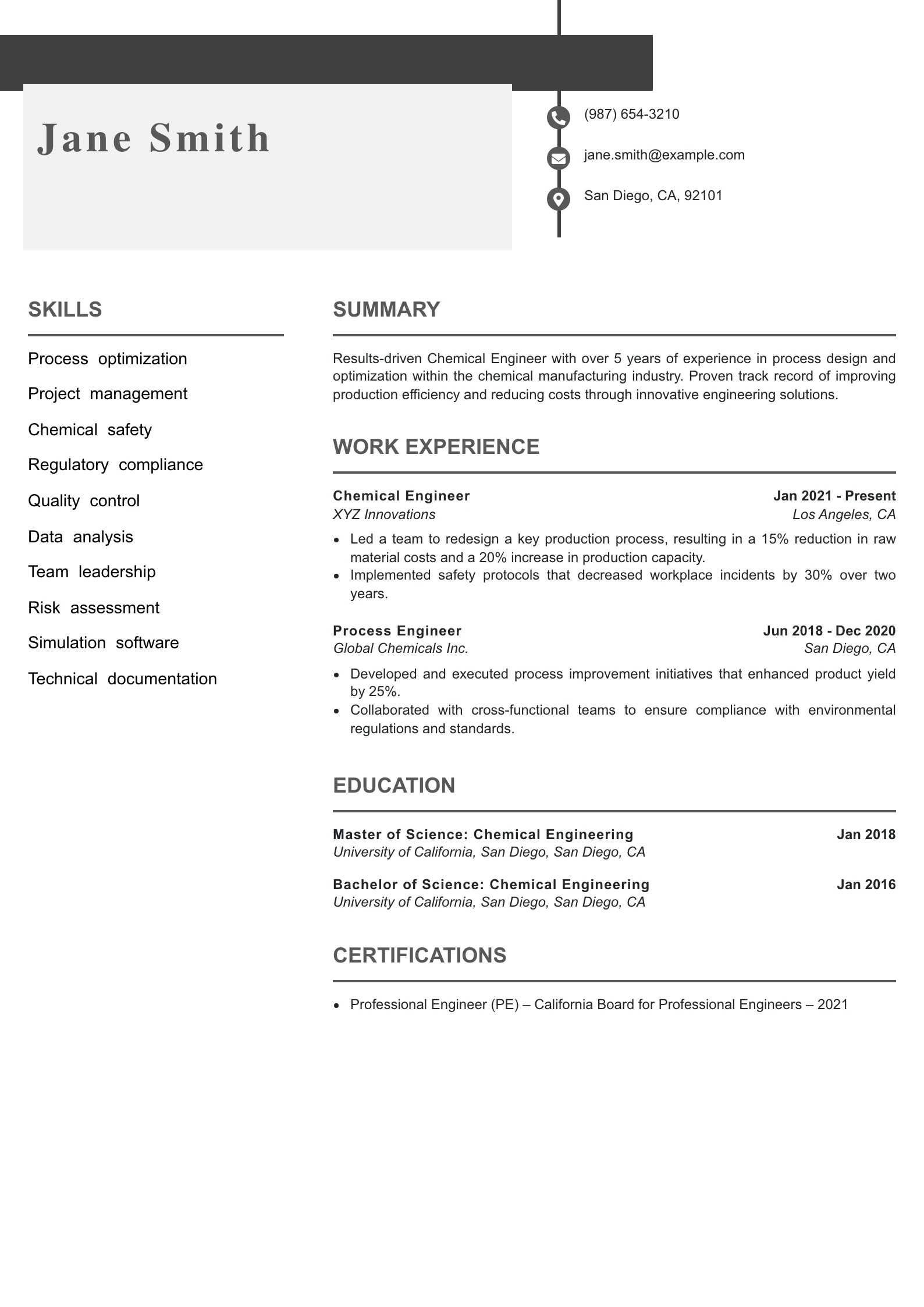
Why This Resume Works
- The summary clearly articulates Jane’s professional identity and highlights her relevant experience in process design and optimization, making it immediately clear to the reader what her expertise is.
- The skills section is directly relevant to the chemical engineering field, showcasing a blend of technical and soft skills that are essential for a marketing manager role, such as project management and team leadership.
- Jane’s work history demonstrates impactful achievements, including specific metrics that quantify her contributions, such as cost reductions and production increases, which effectively illustrate her value as an employee.
- The resume is well-suited for a mid-level position, showcasing over 5 years of relevant experience and a clear progression in responsibility and impact within her field.
- The clarity and professional tone throughout the resume maintain a focus on results and achievements, making it engaging and informative for potential employers.
Senior Level Chemical Engineer Resume Example
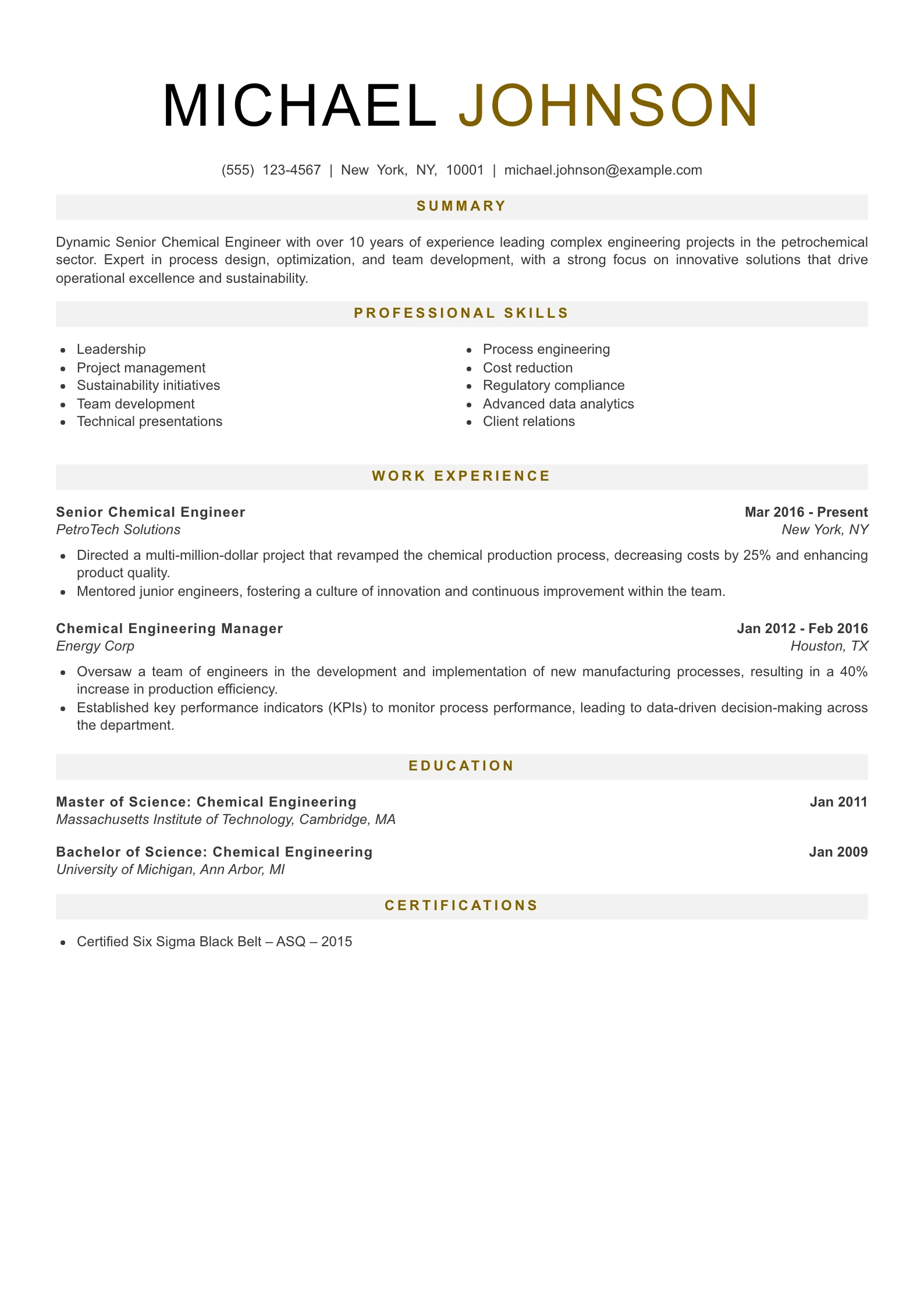
Why This Resume Works
- The summary is clear and concise, effectively highlighting Michael’s extensive experience and expertise in chemical engineering, making it easy for hiring managers to quickly assess his qualifications.
- The skills section is well-rounded, showcasing both technical and soft skills that are relevant to senior-level positions, demonstrating a balance between leadership and engineering capabilities.
- The work history includes impactful achievements with quantifiable results, such as cost reductions and efficiency improvements, which clearly illustrate Michael’s contributions and effectiveness in his roles.
- The job fit is appropriate for a senior-level position, as evidenced by his leadership roles and the complexity of the projects he has managed, aligning well with expectations for a Senior Chemical Engineer.
- The clarity and tone of the resume are professional and confident, conveying a strong sense of competence and readiness for high-level challenges in the engineering field.
How to Craft a Strong Chemical Engineer Resume
A well-crafted resume is essential for Chemical Engineers aiming to secure their next opportunity in a competitive job market. Hiring managers typically look for candidates who not only possess technical expertise but also demonstrate problem-solving abilities and effective communication skills. This guide will help you showcase your strengths effectively, enabling you to stand out from the competition.
1. Summary Statement
A strong summary statement serves as the first impression of your resume and is critical for a Chemical Engineer. This section should succinctly encapsulate your experience level, area of specialization, key soft skills, and any relevant certifications you possess. A compelling summary can capture the attention of hiring managers and set the tone for the rest of your resume.
When drafting your summary, aim for a confident, tailored, and result-focused tone. Use action-oriented language that reflects your achievements and contributions to previous roles. Here’s a structured approach to what to include:
- Experience Level: Clearly state whether you are an entry-level or mid-career professional.
- Specialization: Mention specific areas you excel in, such as process design or materials science.
- Soft Skills: Highlight traits like teamwork, critical thinking, and communication.
- Certifications: Include any relevant certifications that enhance your qualifications.
Motivated Chemical Engineering graduate with hands-on experience in process design and optimization. Eager to leverage skills in data analysis and project management to contribute to innovative chemical solutions.
Mid-Level:
Results-driven Chemical Engineer with over 6 years of experience in process improvement and safety compliance. Proven track record in leading cross-functional teams to optimize production efficiency and reduce costs.
2. Skills & Qualifications
Highlighting the right skills and qualifications is vital for a Chemical Engineer’s resume. You should focus on both core technical skills and essential soft skills that align with the responsibilities of the role. Common core skills may include chemical process engineering, safety protocols, and data analysis, while soft skills often encompass teamwork, communication, and problem-solving capabilities.
To ensure you’re highlighting the most relevant skills, pull them directly from job descriptions and ATS (Applicant Tracking System) requirements. This will make your resume more tailored and likely to pass initial screenings.
Here are some types of skills to consider:
- Core Technical Skills: Process simulation, laboratory techniques, chemical safety.
- Soft Skills: Communication, leadership, analytical thinking, and project management.
- Process simulation
- Chemical safety protocols
- Data analysis
- Project management
- Team collaboration
- Problem-solving
- Regulatory compliance
- Laboratory techniques
Top ATS Keywords for Chemical Engineer
3. Work History
In the work history section, focus on your achievements and the impact of your contributions. Include metrics to quantify your results, especially for mid-level professionals, as this demonstrates how you have driven value in your previous roles. An effective work history should be formatted in reverse chronological order, showcasing the most recent experiences first.
When listing your work history, consider the following tips:
- Use quantified bullet points to detail your accomplishments.
- Highlight leadership roles or specific projects that align with the job you’re applying for.
- Make sure each entry is concise yet comprehensive, ideally no longer than 4-5 bullet points.
Intern, XYZ Chemicals, Chicago, IL, June 2022 – Aug 2022
– Participated in research projects focused on polymer synthesis
– Assisted in the development of safety protocols and documentation
– Contributed to laboratory experiments and data collection
Mid-Level:
Chemical Engineer, ABC Corp, Houston, TX, Jan 2018 – Present
– Led a team in optimizing production processes, resulting in a 15% increase in efficiency
– Developed and implemented safety measures that reduced incidents by 30%
– Coordinated with R&D on new product development, resulting in successful market launch
4. Education
A solid educational background is crucial for Chemical Engineers. Typically, employers look for candidates with at least a bachelor’s degree in chemical engineering or a related field. Mention your degree, the institution, and the graduation year in a clear format.
When formatting this section, ensure consistency in style and layout. Here’s how to present your educational qualifications:
- Degree: Clearly state the degree earned (e.g., B.S. in Chemical Engineering).
- Institution: Name of the university or college.
- Location: City and State.
- Graduation Year: Include the year of graduation.
Degree, School Name, City, State, Graduation Year
Example:
B.S. in Chemical Engineering, Massachusetts Institute of Technology, Cambridge, MA, 2021
5. Additional Sections
In addition to the core sections of your resume, consider adding optional sections that can further showcase your qualifications. These may include Certifications, Languages, Awards, and Professional Affiliations.
For instance, certifications can enhance your credibility and demonstrate your commitment to ongoing professional development. Here are a couple of certification formats specific to Chemical Engineers:
- Certification Name – Certifying Body – Year
- Example: “Certified Chemical Engineer – National Society of Professional Engineers – 2022”
- Professional Engineer (PE) License – State Board of Professional Engineers – 2021
- Certified Safety Professional (CSP) – Board of Certified Safety Professionals – 2020
6. Do’s and Don’ts
To finalize your strong Chemical Engineer resume, keep these practical tips in mind:
Do:
- Tailor for ATS: Use specific keywords from the job posting to enhance compatibility with ATS.
- Show Impact: Quantify your achievements and contributions clearly.
- Use Industry Terms: Incorporate terminology relevant to the chemical engineering field.
Don’t:
- Use Generic Statements: Avoid vague descriptions that do not reflect your true capabilities.
- Ignore Soft Skills: Don’t overlook the importance of soft skills; they are crucial for effective teamwork and communication.
- Overuse Buzzwords: Steer clear of clichéd terms that can dilute the impact of your content.